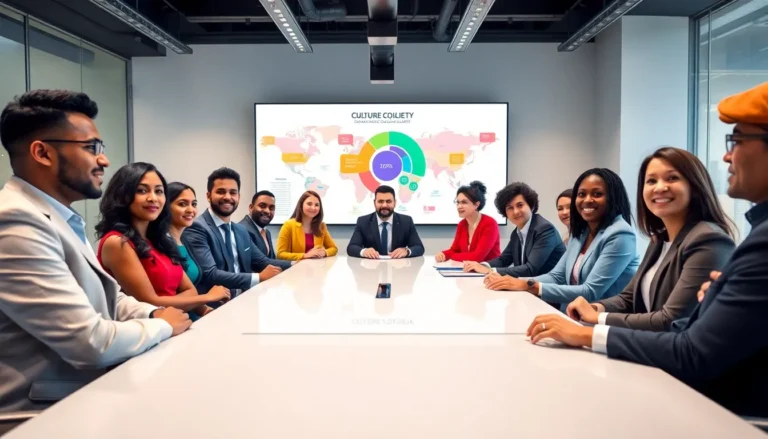In today’s fast-paced work environment, keeping a team motivated can feel like herding cats—challenging and a bit chaotic. Yet, mastering team motivation skills is crucial for turning that chaos into a symphony of productivity. When team members are engaged and inspired, they don’t just show up; they thrive, innovate, and even crack a smile while tackling deadlines.
Table of Contents
ToggleUnderstanding Team Motivation Skills
Team motivation skills encompass the techniques and approaches used to inspire team members. Mastering these skills leads to heightened engagement and improved collaboration.
Definition of Team Motivation Skills
Team motivation skills include a range of abilities aimed at fostering an environment where team members feel encouraged and valued. These skills involve clear communication, recognition of accomplishments, and the ability to set meaningful goals. Understanding individual motivations plays a crucial role in tailoring strategies that resonate with team dynamics. Leadership styles, feedback mechanisms, and trust-building also contribute significantly to defining these skills.
Importance of Team Motivation Skills
Team motivation skills are vital for creating a productive and positive workplace. A motivated team often displays greater creativity and efficiency when solving problems. Engagement levels correlate directly with job satisfaction, translating into lower turnover rates and higher retention. Establishing a culture of motivation can lead to significant increases in overall team performance. This approach not only enhances individual contributions but also strengthens the team’s ability to handle challenges effectively.
Key Elements of Team Motivation Skills

Effective team motivation relies on several key elements that enhance engagement and productivity. These elements include communication, recognition and rewards, and goal setting.
Communication
Clear communication forms the foundation of successful motivation strategies. Team members thrive when they understand their roles and the team’s goals. Open dialogue encourages feedback and fosters trust between leaders and employees. Regular check-ins and team meetings promote transparency, allowing everyone to voice their ideas and concerns. Additionally, utilizing various communication tools ensures that all members stay informed and connected. Overall, effective communication cultivates a collaborative environment where motivation can flourish.
Recognition and Rewards
Recognition and rewards play a crucial role in maintaining team motivation. Acknowledging individual and group achievements boosts morale and reinforces desirable behaviors. Timely recognition encourages team members to continue striving for excellence. Implementing a diverse rewards system, such as verbal praise, bonuses, or team outings, caters to different preferences and fosters inclusivity. Celebrating milestones and successes cultivates a positive atmosphere, making team members feel valued and appreciated.
Goal Setting
Goal setting drives motivation by providing clarity and direction. Establishing SMART (Specific, Measurable, Achievable, Relevant, Time-bound) goals sets clear expectations for team members. Involving the team in the goal-setting process enhances their commitment and investment in the outcomes. Regularly reviewing progress towards goals not only keeps everyone accountable but also allows for course corrections as needed. Ensuring goals align with individual motivations further fosters a sense of purpose within the team.
Strategies for Developing Team Motivation Skills
Developing team motivation skills involves practical strategies that leaders can implement. Focus on enhancing leadership abilities and fostering teamwork through engaging activities.
Leadership Training
Effective leadership training acts as a cornerstone for team motivation. Training programs emphasize skills that promote communication, empathy, and conflict resolution. Cultivating these skills empowers leaders to support individual needs and create a supportive team climate. Workshops allow leaders to practice real-life scenarios, enhancing their ability to motivate their teams under pressure. Incorporating feedback mechanisms helps leaders refine their approaches, ensuring alignment with team goals. Regular coaching sessions further provide opportunities for leaders to develop and adapt to changing challenges.
Team-Building Activities
Team-building activities serve as powerful tools for enhancing motivation. Engaging team members in interactive exercises fosters collaboration and strengthens relationships among colleagues. Activities like problem-solving workshops or outdoor challenges encourage teamwork, making each member feel valued. Scheduling these activities regularly promotes a sense of belonging and camaraderie. Effective team-building sessions also showcase individual strengths, reinforcing trust and communication. Ultimately, these activities create a positive work environment where creativity and motivation thrive.
Measuring the Effectiveness of Team Motivation Skills
Measuring the effectiveness of team motivation skills involves two key approaches: feedback mechanisms and performance metrics. Both elements play critical roles in evaluating how well motivation strategies resonate with team members.
Feedback Mechanisms
Implementing regular feedback mechanisms enhances team motivation. Surveys and one-on-one meetings provide insights into team members’ sentiments. Anonymous feedback encourages candid responses, fostering an environment of trust. Regular check-ins serve as opportunities for team leaders to understand what motivates individuals. Peer feedback also contributes valuable perspectives, highlighting strengths and areas for improvement. These collective insights guide adjustments to motivation strategies, ensuring they align with team needs.
Performance Metrics
Utilizing performance metrics helps quantify the impact of motivation skills. Engagement scores offer a clear indication of team morale. Tracking project completion rates illustrates how motivation influences productivity. Retention rates reveal the long-term effects of effective motivation on team stability. Analyzing individual performance against established goals provides insights into personal achievements within the team framework. Understanding these metrics allows leaders to adjust their approaches, enhancing overall effectiveness and fostering a motivated workforce.
Mastering team motivation skills is essential for creating an engaged and productive workforce. By focusing on clear communication recognition and meaningful goal setting leaders can inspire their teams to excel even in challenging environments. Developing these skills not only enhances individual performance but also fosters a culture of collaboration and innovation.
Implementing effective leadership training and team-building activities further strengthens relationships among team members. This supportive atmosphere encourages creativity and reduces turnover rates. Regular feedback and performance metrics help leaders assess the impact of their strategies ensuring continuous improvement.
Ultimately a motivated team is a resilient team ready to tackle any challenge that comes their way. Investing in team motivation skills is a strategic move that pays dividends in overall performance and workplace satisfaction.








